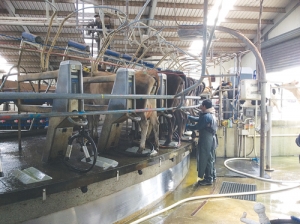State of the Dairy Nation 2024/25: DairyNZ Highlights Record Milk Production and Export Growth
DairyNZ's chief executive Campbell Parker says the 2024/25 dairy season reinforces the importance of the dairy sector to New Zealand.
 Lower order sharemilkers joining the industry over the last 12 months would be struggling to survive, says consultant James Allen.
Lower order sharemilkers joining the industry over the last 12 months would be struggling to survive, says consultant James Allen.
A leading dairy farm consultant says he’s worried that this season’s low milk price will tip some young innovative dairy farmers out of the industry.
James Allen of AgFirst, Waikato, says the most vulnerable are new variable or lower order sharemilkers just starting in the industry.
Allen did a study some years ago for DairyNZ on the state of sharemilking and is widely regarded as an expert in this area.
He says variable order sharemilkers in the 2013-14 season would have had the benefit of the higher $8.40 payout and the resulting retrospective payments. But he says those starting out in the past year and this new season wouldn’t have had the benefit of a good year.
“I feel very sorry for them because they have started out with an extremely low profit and in some cases a cash loss this year. My concern is how those guys are going to manage their cashflows to survive. We don’t want to lose good prospective farm owners.”
Allen says the key issue with a variable order sharemilker agreement is that it is a percentage based agreement, many of them negotiated well in advance of the season, when payout expectations were very good.
There is a limited number of costs these people are in control of, which limits what they can do. Their best option is to maximise production with the resources they have and look hard at their cost structure, he says.
The option of re-negotiating a contract is limited.
“The short answer is probably ‘no’, but there is no harm in bringing up the situation with the farm owner and seeing what capacity there is to renegotiate the contract. Of course the farm owner is going through the same issues with the drop in payout so he will be equally affected. [It will depend on] the capacity and willingness of the other party to look at some sort of contract renegotiation but there are no guarantees or legal requirements to renegotiate.”
Allen says people who go sharemilking need to understand that by doing so they are accepting risk. The only alternative for mitigating such risk is to go contract milking where people are not caught with the low prices.
“Last year many of the contract milkers were feeling quite aggrieved about missing out on the $8.40 payout but this year they are pretty happy about life. The key message is ‘expect more volatility’. We are going to get more of these fluctuations…. If people manage that [by shifting] to a contract milking arrangement they take the risk factor out, but if they go sharemilking they need a financial buffer to manage the highs and lows.”
Meanwhile DairyNZ’s Mark Paine says a lot of variable order sharemilkers are in Taranaki and he says through their various programmes they will target these people.
Sharemilkers lack security with the banks and are often highly geared because they are aiming for farm ownership.
He says they can get hit very hard in times of low prices.
Paine says DairyNZ will do all it can to help sharemilkers because they are the young and progressive farmers and represent the future of the dairy industry.
The Meat Industry Association of New Zealand (MIA) today announced that Chief Executive Officer Sirma Karapeeva has resigned from the role.
The winners of the 2026 Hawke’s Bay/Wairarapa Dairy Industry Awards were announced at the annual awards dinner held at Copthorne Solway Park in Masterton on Thursday evening.
Environment Southland is welcoming this week’s decision by the Environmental Protection Authority (EPA) to approve the release of Blaptea elguetai, a leaf‑feeding beetle that will help control the highly invasive Chilean flame creeper.
This March, the potato industry is proudly celebrating International Women’s Day on 8 March alongside the International Year of the Woman Farmer, recognising the vital role women play across every part of the sector — from paddocks and packhouses to research, leadership, and innovation.
Fruit trader Seeka posted a record profit and returns to shareholders in 2025.
Recent weather events in the Bay of Plenty, Gisborne/Tairawhiti, and Canterbury have been declared a medium-scale adverse event.
OPINION: Staying with politics, with less than nine months to go before the general elections, there’s confusion in the Labour…
OPINION: Winston Peters' tirade against the free trade deal stitched with India may not be all political posturing by the…